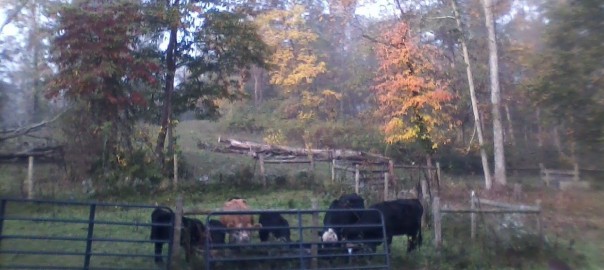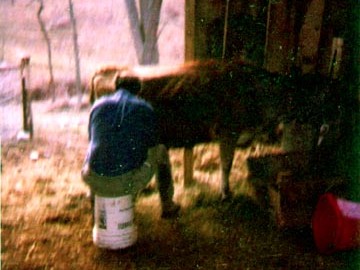Whether our neighbors, coworkers, financial advisors, or all the pundits on the evening news call it this, we are all by design striving for the “good life.” God created us to seek happiness. And though this is programed into our soul to draw us toward Him (Pascal), the soup of cultural voices we swim in may distract us from this ultimate and blessed quest. And what some of us think of as the “good life” may not be “good” after all.
So what is the “good life” and how does one or should one define this? How does one attain it? Let me begin by casting aside any aspersions: there are far sharper knives in the drawer than me for this task, but given my butter-knife mentality, let me take a stab at pointing to why I (and actually St. Thomas Aquinas) believe that the rural life may be the safest haven today to attain the “good life,” particularly for souls with as weak self-discipline as me. I believe most of us fail to experience the “good life”, because we live too blindly in the soup of ease, complacency, and imitation goodness.
My family and I certainly love our rural life in the woods. Admittedly, we didn’t arrive here as the result of great wisdom, but more the result of inheritance. And it ain’t all a bed of roses. From my back porch I can easily identify dozens of tasks that need to be started let alone completed, before winter sets in. And just because it’s nice here and potentially less cluttered by distracting voices doesn’t mean that one can not attain the “good life” in the city.
So how does one aim toward attaining the “good life”? Is there any valid argument that the best place to seek and find the “good life” is in a rural setting? Or, maybe to state it boldly, why farm?
What I will share is from a book whose title boldly proclaims, “The Importance of the Rural Life,” by George Speltz, a priest of the Diocese of Winona, who built his argument “According to the Philosophy of St. Thomas Aquinas.” This was his PhD dissertation for the Catholic University of America, originally published in 1944, and it sat gathering dust on seldom-perused library shelves until it was recently reissued by St. Pius X Press.
There is much in this book, and it’s well worth reading from beginning to end, but the following is a selective summary of St. Thomas’ argument in favor of the rural life and the dignified life and exalted work of the husbandman, i.e., farmer:
1: “According to the Angelic Doctor the ‘good life’ involves other values besides the spiritual. … Man, he affirms, is composed of body as well as of soul. Accordingly, anything that helps to conserve the life of man represents a good for him. … Even though [Man] be virtuous he can yet suffer evil through the lack of bodily goods; and having fallen into this evil he will be sorrowful” (pg 2).
Therefore, the “good life (happiness) is not only a betterment of the soul, but of body and soul, the whole person. Stoics and Gnostics, and many modern Christians, emphasize only the soul, but one cannot have a happy soul (grow in holiness) if the needs of the body are not being met.
2: “An adequate provision of material goods is necessary for the practice of virtue.” Consequently, “St. Thomas does not regard it as unbecoming for man to work with the material goods of this earth in order that they may serve the purpose for which they were created—human needs—as perfectly as possible” (3-4).
Spending many hours each day, therefore, getting our hands dirty until our muscles ache is a good thing, as long as end of our work is good.
3: “St. Thomas insures against an overemphasis of bodily goods by calling them ‘Instrumental.’ … In practice, however, modern man has become inordinately preoccupied with them” (pg. 4).
All material goods in this world are instrumental means to the ends for which they were created. Material goods are not ends in themselves. However, in our sinfulness, we human beings “become inordinately preoccupied with them” as ends for which we dedicate our time, talents, and money to accumulate.
4: “The Thomistic synthesis provides against this disorder by pegging material goods into a fixed place within the hierarchy of man’s need. This is achieved in part, by relegating them as means to an end that is outside and above them, to an end that is fixed and capable of controlling them… [Material] goods that pertain to the conservation of an individual, i.e., those that are immediately ordered to a fundamental need of the body, as food and drink, are called goods of the body (bonum cporporis); those that are not ordered in a general way to human needs, fall into the class of external goods (bonum exterius). Such are riches (divitiae). Of these two classes of material goods, those called ‘bodily goods’ are the higher because necessary for the practice of virtue” (pg. 5).
Not all material goods are equal instruments because the ends for which they were created are not equal: the highest goods, of course, are those which unite us with God (”divine goods”); the second highest are those that nurture our soul; the third highest are “bodily goods” which provide the needs of the body (food, drink, clothing, shelter), which enable us to reach for the higher goods; and the lowest are the rest, external goods: they do not naturally unite us with God, nurture our soul, or provide for our bodily needs. God can certainly use anything by grace to bring us to Him, but this is out of the ordinary, and we must beware of using this as an excuse for accumulating material goods.
5: “The amount of [bodily goods] necessary for the practice of virtue, and consequently for the good life, is strictly limited, a truth emphasized both by Aristotle and by Aquinas. On the other hand, external goods, namely riches, inasmuch as they are ordered only in a general manner to human needs, are not regarded as essential for ‘an act of virtue.’ Since riches are sought for their power to procure other things rather than for the direct satisfaction of some bodily need, they easily come to be desired inordinately. … As a result of this inordinate desire for riches man is unduly preoccupied with the quest for material goods, failing to realize, as St. Thomas points out, that riches are the least among human goods” (pg. 5,6).
Comparing “bodily goods” with “exterior goods,” bodily goods are self-regulating, whereas exterior goods are not: normally we can only eat just so much, wear just so many clothes, and need only so much shelter. A person can determine how much he needs to eat in a day, a week, a month, and a year, and plan, procure, and store this. A person can also determine what kind of clothes she needs to meet the demands of the climate in which she lives, and plan, procure, and store this. And a person can determine how much he needs to shelter himself and his family, then build, and maintain it. Certainly our concupiscence can lead us to crave more food, clothing, and shelter than we need, like the man in the Gospels who tore down his old barns to build new ones, but still we always can compare what we have, or want to have, to what we really need.
With the lesser “exterior goods,” however, there is no inherent need, so essentially anything at all is over and above what we “need”. Certainly God has created and allowed these external goods for our enjoyment, but our concupiscence can convince us we “need” these things—to keep up with the Jones, or sustain our reputation in the community or state of life, or just because we have more than enough money to provide for our bodily needs. With no obvious need level, there is no limit to the amount of material goods we can justify for ourselves. We can become so attached to them that we become convinced we cannot live without them!
6: “Guided by this scale of values, St. Thomas gives an eminent place in the hierarchy of human activities to the life of the husbandman [i.e, farmer], whose work is ordered to the procuring of bodily goods for the immediate use of the household. … As a corollary of their teaching on the secondary place of external goods, both Aristotle and Aquinas warned against the practice of trading. Because of the latent greed in men, those who traded might easily fall into the practice of trading for the purpose merely of amassing external goods. Such trading would be directed to the unnatural and limitless end of amassing money, ever more money” (pg. 6,7)
Contrary to our modern culture’s view, Aquinas ranked the husbandman one of the highest occupations in the community of man, comparable to a teacher or doctor. Aquinas considered the work of the husbandman “noble in its purpose, namely, to provide the necessities of life” (16-17), which are needed for the nourishment of the soul leading to union with God. Most other occupations focus on producing, trading, or selling “external goods” that have no inherent eternal need or purpose. This does not mean these lesser things are evil or these occupations, for the technology to produce them are gifts of God’s creation, but as lesser goods with no inherent limitation, they can be desired inordinately.
7: “Since the need of any one household for natural wealth, such as food and clothing, is limited, so also the activity of the husbandman, as long as it was directed to the procuring of the bodily goods and not of eternal goods primarily, was proportionately limited and tended less to become inordinate. It was comparatively easy in the agrarian way of life advocated by Aristotle and Aquinas, for the people to retain a true evaluation of bodily goods, as opposed to external goods, the former having a fixed relation to the needs of the various households” (pg. 6).
In other words, when families lived in a rural setting, in small communities, where generally everyone was content with producing sufficient bodily goods, a farmer’s work and life were also, therefore, naturally limited. Though farm work was hard and physically demanding, he knew when his work was done. He could relax contented once he had done all that he needed to do that day to provide bodily needs for his family. As long as they lived untouched by the obsession of the outside world for lesser material goods, the simple contented farm family lived happy and content with the food, drink, clothing, shelter, and spiritual enrichment of their local parish.
But when the simplicity of the rural farm family was shattered by the lure of the city, when farm children were lured away to work in factories, or to train in colleges for leadership roles in those factories, or trading houses, or investment firms, not for the procurement of more bodily goods or spiritual enrichment, but for “wealth and what it could buy,” their lives became limitlessly driven. Or, as the post-World War 1 song taunted, “How you gonna keep ‘em down on the farm, after they’ve seen Paris!”
And even the natural limits of bodily goods became shattered, for today, when does one ever have enough specialty foods, designer clothing, suburban sprawl homes, electronics, cars, toys, books, CDs, DVDs, games, and money? When can anyone sit back and relax content that they have produced and accumulated all the material goods they will ever need? When have we reached our “number” to know we have invested enough in our 401Ks to provide all the material goods we will need to keep us “in the lifestyle to which we have become accustomed” until we die—which today is being extended longer and longer!
8: And one last thing, though St. Thomas has much, much more! “The husbandman uses his rational faculties to direct the organic and non-organic forces of nature to the production of new things (pg. 17). … The agricultural worker is distinguished from his fellow manual laborers in this, that it is given to him to participate in this cooperation with God in a unique way. … The non-agricultural worker, on the other hand, even though he does impart greater utility and beauty to the things of earth, yet he cannot really be said to be making the earth bring forth new basic materials. This is the task of the husbandman. When he acts as an instrumental cause in God’s hands, he releases a host of natural, organic causes. He taps the fonts of productivity which God has placed in things. … The art of husbandry, which produces the fruits of the earth in cooperation with an interior principle of nature, namely, its organic powers, therefore shares in some way the dignity of the arts of teaching and medicine, and exceeds in dignity the art of carpentry” (pg. 53-55).
The farmer uniquely taps directly into the creative energies that God instilled into His Creation to provide for the bodily goods of his family, his community, and the world. When he grows vegetables or raises cattle, he is cooperating with God’s creative grace; the farmer is not doing anything but helping God’s Creation provide the food, drink, clothing, and shelter that God had already empowered His creation to produce. And though the technologies that underly all other occupations at their core emerge from the gifts that God planted in His creation, yet the use of these technologies to produce lesser material goods are not always a natural cooperation with God’s Creation, using these technologies for their intended ends. The technology to build a computer chip is a gift of God, but the Third-world factory workers in a sweat shop producing smartphones for the affluent in first-world nations are not doing anything connected to a natural process in Creation, nor are they producing anything that meets their bodily needs, nor is their work in anyway naturally limited: they will work as long as their employer demands—as many hours and days as he demands, to produce as many products as he deems necessary to produce the money he believes he needs—so they can scratch enough money to hopefully provide for the bodily needs for their families, to say nothing of any spiritual enrichment.
The problem is that we live in a culture that places its highest values on the production and lust of the lesser material goods; even the “poor” are defined by our government, not for their lack of boldly needs, but for their inability to procure the lesser material goods that our culture considers their rights in our civilized state.
Ironically, our culture has become obsessed with providing insured health care for every single person, so that everyone can live as long as possible—so they can have more time to grow in holiness and eventual union with God, or even to enjoy as long as possible a simple life contented with the basic bodily needs? No, so they can enjoy and have more and more of the lesser external goods, which have no natural limits, in full-service condominium communities with full-time nursing services near golf courses with paved pathways for their medicare financed Hover-Rounds. Lord, help us.
We live in a culture, an entire world that has it all bass ackwards. We reward and honor those who dedicate their entire lives to producing, promoting, and getting rich on the lesser materials goods of this world, all of which remain in the “box” when the lid is closed on this life (another blog). Yet we look askance at those who have chosen the simple rural life, who have dedicated their lives to providing for their families those things that are most essential.
The problem is that these values of our culture have so infiltrated every aspect of our lives, that even those dedicated to providing the basic bodily needs of our world—food, clothing, shelter, and even spiritual enrichment—are encouraged to do so primarily to accumulate more and more money, not to provide the top three levels of goodness, but to fill their lives with lesser material things. Farmers now use thousands of dollars of high-tech equipment to farm thousands of acres to provide high-yield (but often low nutrition) crops to make sufficient profit to, not only provide the food, drink, clothing, and shelter their family needs, but the external goods they deem necessary to consider themselves as progressive as the city dwellers they see portrayed on network television.
And the worst of it all is that, though you can read this and freely reflect upon it to decide whether any of this is true and applicable to your lives, I’m actually publishing this on my blog and not living it! Lord, help me!
Please pray for me, and I’ll ask Him to bless you as we consider together the reasons that we labor and the things for which we labor, and how much of this is far, far more than our bodily needs, and too often a hindrance to the enrichment of our souls and union with God.












